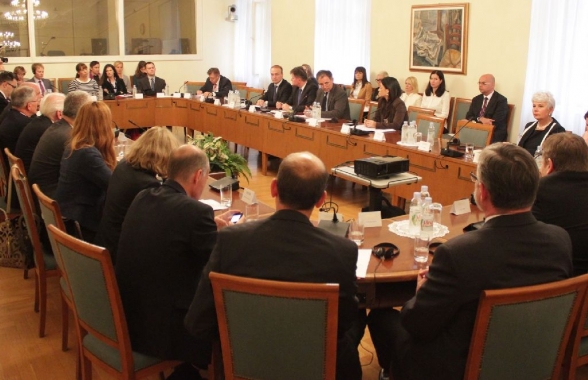Delegation of the Committee on International Relations and Emigrants composed of Miodrag Vuković prof. PhD, Žana Filipović and Nikola Gegaj attended the Fifth meeting of chairpersons of foreign policy committees in the region of South East Europe: Montenegro, Bosnia and Herzegovina, Croatia, Macedonia and Serbia. The meeting was attended by numerous representatives of the Croatian government and ministries as well as representatives of the European Commission and the European Parliament.
Meeting was focused on commercial and economic cooperation in the region and the expansion of membership in the European Union.
Opening the meeting, Milorad Pupovac prof PhD, Chairperson of the Foreign Policy Committee in the Croatian Parliament, welcomed the accession of Macedonia and expressed will of Slovenia to participate this year in the Fifth Meeting with the conclusion that the basis of good regional cooperation is reflected in the creation of regional policies aimed at improving the economic potential of countries in the region, especially when it comes to projects in the field of infrastructure and energy.
Chairperson of the Committee on International Relations and Emigrants Miodrag Vuković prof PhD, pointed out that Montenegro defined regional cooperation as one of the most important foreign policy priorities with the constant development of political, economic, security, cultural, scientific contacts, as well as important infrastructure connection between countries in the region. Chairperson Vuković pointed out that Montenegro with neighboring countries shares not only the same geographical space, but also the same foreign political goals, concluding that progress of each country in the region would be a stimulus for the progress of Montenegro.
Speaking about the commercial and economic cooperation between the countries in the region, Chairperson Vuković pointed out that countries in the region essentially do not need to compete with each other, but to work together to be competitive on the European and world markets. Chairperson Vuković informed participants of the Fifth Meeting about the important economic projects of Montenegro noting that energy is one of the pillars of economic development of the country, as well as the project of building an undersea cable between Montenegro and Italy, as a special contribution to the energy development of the entire region, because the energy cable will be one of the main corridors for electricity transit to Europe and with its construction the goals of the Energy Community are fulfilled, namely investment, economic development, security of supply and social stability, thus creating conditions for the opening of the electricity market, which includes not only electricity trading but and production. Willingness for cooperation of the Western Balkan countries in important economic and commercial projects is confirmed with joint effort to participate in projects of importance for the whole region, such as the construction of the Ionian Adriatic Pipeline, where one part of it should pass through Albania, Montenegro, Bosnia and Herzegovina and the Republic of Croatia.
Speaking about the enlargement of the European Union, Miodrag Vuković prof PhD stated that Montenegro is in the process of negotiating for two years and that 12 chapters have been opened, two of which are temporarily closed, and that the entry of our country into the European Union and NATO are the most important foreign policy goals. The announcement which says that there will be no enlargement of the EU in the next five years should not discourage the candidate countries in the region. On the contrary, inter-regional cooperation and contacts with the European institutions should be activated, as the EU enlargement to the countries of the region is equally important for both the European Union and for those states.
Once the discussions have been completed, participants of the Fifth Meeting formulated and adopted Conclusions, which will be discussed and adopted at meetings of the foreign policy committees of parliaments in the region.








